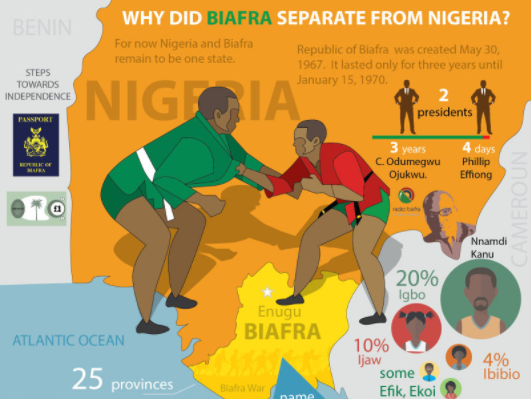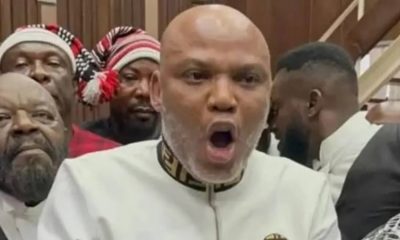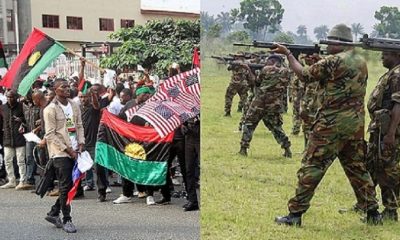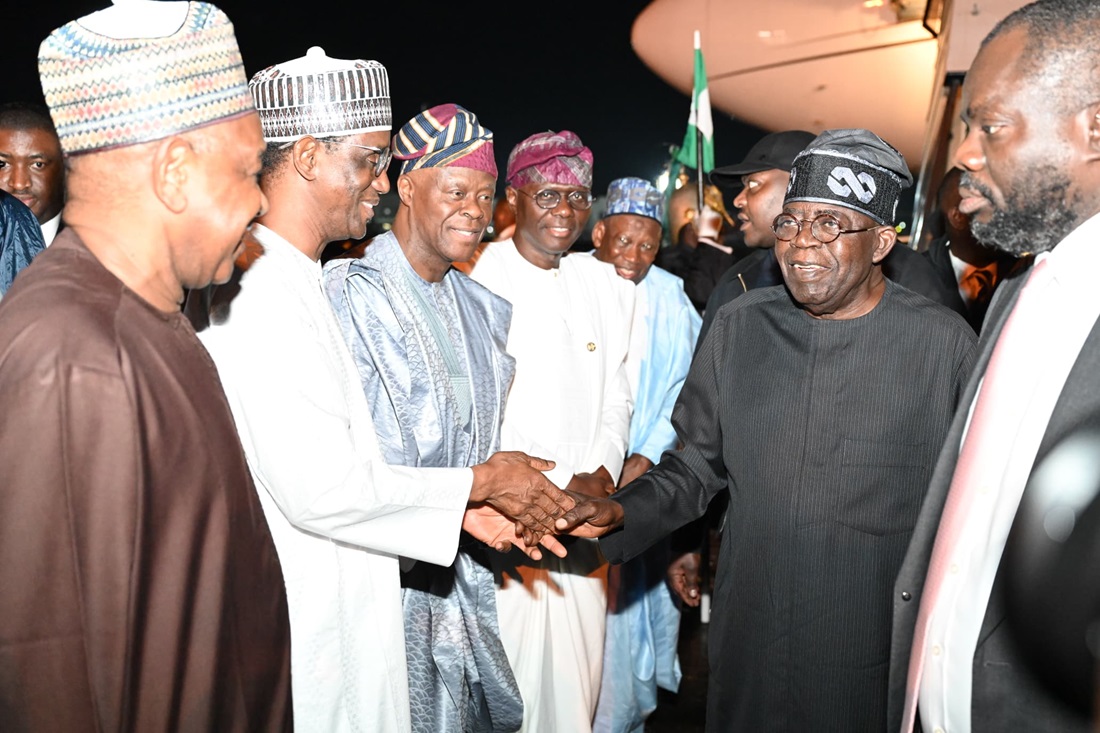Feature/OPED
Biafra Restoration and the Social Contract Restructuring

By Omoshola Deji
The most embraced notion on the evolution of the state is the social-contract thought promulgated by Thomas Hobbes in the ‘Leviathan’, published in 1651.
Hobbes posits that the state is a product of the society; each individual submits a portion of their rights to a consented authority in interchange for an assured protection of their other rights.
The consented authority presides over the equitable distribution of resources, justice, fairness and the rule of law.
Uncomplicated, the consented authority in this case is the Nigerian government and Hobbes’ social-contract theory is employed to unmask the factors provoking the disintegration of Nigeria.
There is a national consensus that the over 250 ethnic groups inhabiting the Northern and Southern protectorates did not assent to be amalgamated into a nation called Nigeria in 1914. For that reason, one may contend that Hobbes’ social-contract theory does not appropriately rationalize the evolution of the Nigerian state. Inside out, one may also backtrack to the pre-colonial era and contend that the social contract principle had already been endorsed in the amalgamated protectorates before the advent of colonialism.
Virtually every ethnic group had a monarch and a traditional mode of worship before the Islamic and Christian missionaries cajoled and compelled us to shift faith.
Our progenitors submitted their right of choice to the oracle whom they believe is in the best position to select the right ruler for them. Everyone wholly obey whoever the oracle selects based on the conviction that he is the representative of the gods on earth.
Like a wisp of smoke, this conviction is fast fading due to the emergence of alternative and modern forms of governance, civilization and political impositions. To aptly ground the theoretical position of this piece, a bit of flashback is essential to justify the subsistence of Nigeria as a social contract.
Colonialism is the aftermath of the resolutions reached at the Berlin 1884 scramble and partition for Africa conference organized by Otto Von Bismark, the then Chancellor of Germany. Out of sheer meanness to dominate and exploit Africa’s resources, the European nations partitioned Africa into colonies without considering her ethno-religious and socio-cultural diversities.
Inconsiderately, the African rulers were not invited to the 1884 conference that sealed the political-economic fate of Africa.
In point of fact, our existence as a nation kicked off when Britain gained possession of the territories amalgamated to institute Nigeria. Lord Lugard only named and formalized it in 1914.
Observingly, it rarely surfaced in the history books that the amalgamated ethnic groups protested against the 1914 amalgamation.
To be fair, Lugard’s amalgamation may not have been protested due to the fear of the colonial master’s brutality.
Fast-forward to after four decades, during the struggle for independence, the Nigerian nationalists, from every region, teamed up to demand the independence of the Nigerian state as structured by Lord Lugard.
After Nigeria’s independence on October 1, 1960, the nationalists virtually made no attempt to dissolve the amalgamation. This ultimately infers that the foremost nationalists, tacitly or explicitly, resolved that we all shall cohabit together as one Nigeria. The social-contract principle naturally takes effect under such circumstance.
If the nationalists, from every region, abstain from disbanding Nigeria, then it’s not right for anyone to proclaim that we Nigerians never agreed to live together. Not for long, our diversity crushed the unity sooner than expected.
Ethnic rivalry and power struggle impelled the late Odumegwu Ojukwu to declare the secession of Biafra from Nigeria on 30 May, 1967. The decision to secede was apparently due to the wanton inter-ethnic killings and tension that brewed from the alleged Igbo coup of January 1966 and the alleged Hausa counter-coup of July 1966.
The 1967 Biafra secession activated a civil war between the Biafran forces and the Hausa-Fulani largely populated Nigerian army. After 30 months of intense battle and the loss of over a million lives, Biafra surrendered to ‘go on with one Nigeria’ – Gowon.
Unambiguously, the defeated forces upon surrendering Biafra were covertly or overtly re-entering into a social contract with Nigeria on the basis of political, economic and social equity.
The Biafra secession quest recently resurrected and gathered momentum due to President Muhammadu Buhari’s earlier disregard for a court order granting Nnamdi Kanu bail after he was accused and arraigned for treason.
The prolonged detention of Kanu earned him an unprecedented sympathy from the people of Igbo extraction who picture Buhari as anti-Igbo.
Unfortunately, Buhari’s oration that the North’s 97 percent and Southeast’s 5 percent voting pattern would influence government’s conduct and the subsequent conspicuous marginalization of the Igbos rained fuel in the burning fire.
The more Buhari ring-fence himself with people from the northern extraction, the more the other southern regions, especially the southeast would become suspicious and continue to play the last card of secession.
An overview of the top political offices and vital appointments reveals that the North is overpoweringly favoured against the South thus:
President – North; Senate President – North; Speaker of the House of Representatives – North; Independent National Electoral Commission (INEC) – North; Acting Secretary to the Government of the Federation – North; Army – North; National Security Adviser – North; Department Of Petroleum Resources (DPR) – North; Economic and Financial Crimes Commission (EFCC) – North; Air Force – North; Police – North; Nigeria Security and Civil Defense Corps (NSCDC) – North; Nigeria Ports Authority (NPA) – North; Department of State Security (DSS) – North; Nigeria Immigration Service (NIS) – North; Fire Service – North; National Insurance Commission – North; National Emergency Management Agency (NEMA) – North; Customs – North; State Chief of Protocol – North; Accountant General of the Federation – North; Asset Management Company of Nigeria (AMCON) – North; Chief of Staff to the President – North; Aide de Camp to the President – North; …the list continues.
It is bewildering that Buhari, a former Head-of-State, who is conversant with ethno-religious sensitivity of Nigeria, could commit the sacrilege of being sectional and nepotistic. Ask no further, Biafra is a reaction to the marginalization the Igbo’s are getting from their social-contract with Nigeria.
Recall the lop-sidedness in the Department of State Security (DSS) recruitment exercise. More individuals were recruited from Katsina state (51) than the entire Southeast states (44). Katsina is the home state of Buhari and Lawal Daura, the Director General of the DSS.
The geographic details of the enrolment exposed that out of 474 recruited cadet officers, 331 were from the North while 143 were from the South. Justifying the lop-sidedness, the DSS and the federal government claimed that the recruitment imbalance was purposely done to rectify the disproportion in previous enrolments.
This excuse holds no water for a government that came to power on the mantra of change. Where is the change promised, if previous leaders were sectional and Buhari is also sectional?
Apparently, no Nigerian democratically elected president has vigorously displayed sectionalism like Buhari.
Cast no doubt, protests and hate speeches would have popped up from the North if an Igbo president ever emerges and decides to impose an ethno-religious, sectional and nepotistic institutional arrangement.
Contravening section 21(2) of the Pension Reform Act 2014, Buhari removed a south-eastern woman, Chinelo Anohu-Amazuan as the Director General of National Pension Commission, PenCom, and replaced her with Aliyu Abdulrahman Dikko, a northerner.
Section 21(2) of the PenCom act stipulates that if the Director General of the commission is sacked before the expiration of his/her tenure, the president shall appoint a replacement from the same geopolitical zone.
Buhari’s parochialism, insularism, nepotism and sectionalism fertilized the Igbo’s consciousness to revive Biafra.
Any intention to crush Biafra without addressing the basic issue of inequality is to be sheepishly applying force without focus. The much-needed first step to national unity is to reassign the political appointments to reflect the pluralism of Nigeria.
In power, but limited in power, Acting President Yemi Osinbajo cannot effect the essential adjustments; he is tactically acting Mr Nice Guy in order not to appear disloyal, power-centric and desperate.
Quite ignoble, top government functionaries are pretending not to know the meaning of restructuring.
To get them educated, the restructuring of Nigeria means effecting three basic things: the devolution of powers to reflect true federalism; ratifying the states to control their resources and; rectifying the lop-sidedness of crucial government appointments to reflect regional equity and fairness.
If truth be told, the Igbo disaffection and the right to self-determination doesn’t mean Nnamdi Kanu’s approach is right. He lacks the strategy of attainment and the essential qualities of a credible leader. His orations are uncouth, obtuse, provocative and indeed treasonable.
Kanu should be enlightened that his ranting, hate speeches, confrontations and threats of war cannot bring forth Biafra; persuasion and dialogue is key.
Deficient in intelligence, Kanu fails to reason that his disciples cannot withstand the viciousness of a police acting on a court or presidential orders. Kanu fails to reason that his admirers shouting “oh yeah, oh yeah, oh yeah Nnamdi Kanu is another saviour” cannot influence his release if the court orders him back to prison. His admirers would quickly forget him like he has allegedly forgotten the other Biafran agitators that were refused bail.
Kanu’s episode might end in tragedy if he doesn’t change strategy. The Judas in his disciples or the south-eastern political bigwigs feeling outshined by his growing popularity might decimate him.
Why always unfortunate? Nigeria recorded virtually no progress under the sixteen year rule of the Peoples Democratic Party (PDP) whose chiefs ruthlessly looted the commonwealth.
Disheartening, the All Progressives Congress (APC) change mantra is manifesting as a political gimmick and deceit. APC promised change, but virtually nothing has changed positively.
Without further ado, Buhari needs to review or order the review of his kith-kin-and-kindred, extremely lopsided, political appointments to reflect regional equity. Appointing prominent and competent Igbos into crucial positions would pacify frayed nerves, promote national unity and the quest for Biafra will naturally fade.
The solution to Nigeria’s disintegration is hidden in the federal government’s readiness to abide by Hobbes’ social-contract principle of ensuring the equitable distribution of resources, political offices, justice, fairness and the rule of law.
Only political and regional parity can sustain a sovereign Nigeria’s unity for another 57 years multiply by 57.
Omoshola Deji is a political and public affairs analyst. He wrote in via mo******@***oo.com
Feature/OPED
Revived Argungu International Fishing Festival Shines as Access Bank Backs Culture, Tourism Growth

The successful hosting of the 2026 Argungu International Fishing Festival has spotlighted the growing impact of strategic public-private partnerships, with Access Bank and Kebbi State jointly reinforcing efforts to promote cultural heritage, tourism development, and local economic growth following the globally attended celebration in Argungu.
At the grand finale, Special Guest of Honour, Mr Bola Tinubu, praised the festival’s enduring national significance, describing it as a powerful expression of unity, resilience, and peaceful coexistence.
“This festival represents a remarkable history and remains a powerful symbol of unity, resilience, and peaceful coexistence among Nigerians. It reflects the richness of our culture, the strength of our traditions, and the opportunities that lie in harnessing our natural resources for national development. The organisation, security arrangements, and outlook demonstrate what is possible when leadership is purposeful and inclusive.”
State authorities noted that renewed institutional backing has strengthened the festival’s global appeal and positioned it once again as a major tourism and cultural platform capable of attracting international visitors and investors.
“Argungu has always been an iconic international event that drew visitors from across the world. With renewed partnerships and stronger institutional support, we are confident it will return to that global stage and expand opportunities for our people through tourism, culture, and enterprise.”
Speaking on behalf of Access Bank, Executive Director, Commercial Banking Division, Hadiza Ambursa, emphasised the institution’s long-standing commitment to supporting initiatives that preserve heritage and create economic opportunities.
“We actively support cultural development through initiatives like this festival and collaborations such as our partnership with the National Theatre to promote Nigerian arts and heritage. Across states, especially within the public sector space where we do quite a lot, we work with governments on priorities that matter to them. Tourism holds enormous potential, and while we have supported several hotels with expansion financing, we remain open to working with partners interested in developing the sector further.”
Reports from the News Agency of Nigeria indicated that more than 50,000 fishermen entered the historic Matan Fada River during the competition. The overall winner, Abubakar Usman from Maiyama Local Government Area, secured victory with a 59-kilogram catch, earning vehicles donated by Sokoto State and a cash prize. Other top contestants from Argungu and Jega also received vehicles, motorcycles and monetary rewards, including sponsorship support from WACOT Rice Limited.
Recognised by UNESCO as an Intangible Cultural Heritage of Humanity, the festival blends traditional fishing contests with boat regattas, durbar processions, performances, and international competitions, drawing visitors from across Nigeria and beyond.
With the 2026 edition concluded successfully, stakeholders say the strengthened collaboration between government and private-sector partners signals a renewed era for Argungu as a flagship cultural tourism destination capable of driving inclusive growth, preserving tradition, and projecting Nigeria’s heritage on the world stage.
Feature/OPED
$214Bn Missing, Institutions Silent: Is Accountability Dead in Nigeria?

By Blaise Udunze
Between 2010 and 2026, a staggering $214 billion, approximately N300 trillion in public funds, has been reported as missing, unaccounted for, diverted, unrecovered, irregularly spent, or trapped in non-transparent fiscal structures across Nigeria’s public institutions.
That figure is not speculative but a conservative estimate of unaccounted funds. It is drawn from audit reports, legislative probes, civil society litigation, executive directives, and investigative findings spanning more than a decade. If it is to go by the accurate figure, the true national loss is likely higher but difficult to quantify precisely due to data gaps, overlapping figures, and incomplete audits.
The challenge is that in many of the most prominent cases, prosecutions have stalled, hearings have dragged without resolution, investigations have gone cold, and no defining jail terms have etched accountability into Nigeria’s institutional memory. The irony is that the number is historic, the silence is louder. And the economic damage is cumulative.
The pattern stretches from the oil sector to social investment programmes, from the Nigeria Central Bank of Nigeria (CBN) interventions to ministry-level expenditures. In 2014, between $10.8 billion and $20 billion in unremitted oil revenues linked to the Nigerian National Petroleum Corporation triggered national outrage. Under the then CBN governor, Lamido Sanusi, who warned that persistent oil revenue leakages were making exchange rate stability “extremely difficult.” He cautioned that without full remittances, the alternative would be currency devaluation and financial instability. This concern spans the 2010 to 2013 oil revenue period. That warning proved prophetic.
This is because, years later, the lack of transparency in the oil industry did not disappear, but rather it festered like cancer. It further led to the elongated audit queries, which have continued to trail the Nigerian National Petroleum Company Limited, including unremitted revenues, questioned deductions, and management fee structures under the Petroleum Industry Act. With an extraordinary move aimed at blocking revenue leakages at source, President Bola Ahmed Tinubu has recently issued an Executive Order suspending certain deductions and directing direct remittance of taxes, royalties, and profit oil into the Federation Account, which involves the reassessment of NNPC’s 30 per cent management fee and 30 per cent frontier exploration deduction under the Petroleum Industry Act.
Such presidential intervention underscores the scale of concern, which means that Nigeria cannot afford a structural lack of transparency in its most strategic revenue sector. But oil is only one chapter.
The Central Bank of Nigeria has faced some of the most far-reaching audit alarms in recent years. In suit number FHC/ABJ/CS/250/2026, the Socio-Economic Rights and Accountability Project (SERAP) is asking the Federal High Court to compel the CBN to account for N3 trillion in allegedly missing or diverted public funds. The Auditor-General’s 2025 report cited failures to remit over N1.44 trillion in operating surplus to the Consolidated Revenue Fund, over N629 billion paid to “unknown beneficiaries” under the Anchor Borrowers’ Programme, and more than N784 billion in overdue, unrecovered intervention loans.
There were also N125 billion in questioned intervention expenditures, irregular contract variations exceeding N9 billion, and procurement gaps running into hundreds of billions. The Auditor-General repeatedly recommended recovery and remittance. No date has been fixed for the hearing. Meanwhile, Nigeria continues to borrow.
Elsewhere, the House of Representatives has launched a probe into over N30 billion recovered during investigations into the National Social Investment Programme Agency (NSIPA). The funds, reportedly frozen during investigation, have not been remitted back into the Treasury Single Account, stalling poverty-alleviation schemes like TraderMoni and FarmerMoni. Millions of vulnerable Nigerians remain exposed while lawmakers search for money already “recovered.” The irony is staggering as funds are found, but programmes remain frozen.
A top discovery recently that put the nation on red alert was made by the Senate committee, which claimed to have found N210 trillion in financial irregularities in NNPC accounts between 2017 and 2023, including unaccounted receivables and accrued expenses. A critical concern is that, as of early 2026, this has sparked commentary but no clear prosecutions.
Only recently, in the power sector, SERAP has urged the President to probe alleged missing or unaccounted N128 billion at the Federal Ministry of Power and the Nigerian Bulk Electricity Trading Plc. Of concern is that despite the enormous funds channelled in this sector, Nigeria’s chronic electricity instability persists, even as billions meant to stabilise the grid face audit scrutiny.
Across MDAs, audit reports between 2017 and 2022 flagged trillions in unsupported expenditures, unremitted taxes, unauthorised payments, and statutory liabilities never recovered. These sums are dizzying and are also alarming; N300 billion here, N149 billion there, N3.403 trillion across agencies, N30 trillion-plus Treasury discrepancies raised at the Senate level.
Individually, they shock. Collectively, they define a structural pattern. And patterns shape economies.
Nigeria operates with structural fiscal deficits and also lives with them routinely and comfortably. Expenditure persistently exceeds revenue. When public funds disappear, fail to be remitted, or are trapped outside constitutional channels, the deficit widens. The government must borrow to fill gaps created not only by low revenue, but by revenue leakage.
Debt servicing now consumes a disproportionate share of federal revenue. Borrowing meant for capital projects increasingly finances recurrent obligations. The country shifts from borrowing to build to borrowing to survive. Every missing naira compounds tomorrow’s liability.
The Treasury Single Account (TSA) was designed to plug such leakages. It consolidated government revenues under Section 80 of the Constitution into a unified framework. International financial institutions commended it as a landmark reform. Yet even today, the Minister of Finance, Wale Edun, has admitted that substantial government funds remain outside the TSA and outside the CBN’s consolidated visibility. Until August 1, 2024, he revealed, the federal government could not fully see its own balance sheet at the apex bank. That admission should alarm any serious economy.
Fiscal lack of transparency constrains planning. It undermines monetary coordination. It weakens debt sustainability projections. It distorts policy responses. And when systems are in flux, money vanishes more easily.
Changing or weakening the TSA in such an environment would be catastrophic. Transitions create windows of vulnerability. Old accounts close. New accounts open. Reconciliation’s lag. Ghost contractors reappear. Double payments slip through.
Albeit, the government must learn to tread with caution as Nigeria’s institutional bandwidth is already strained by simultaneous tax reforms, exchange-rate adjustments, subsidy removal, and fiscal restructuring. One truth that cannot be argued is that layering additional structural upheaval onto fragile systems risks revenue loss that the country cannot afford. Investors are watching.
Credit markets evaluate not just numbers but institutional consistency. A nation that abandons or weakens its most credible fiscal reform sends a destabilising signal. Stability lowers borrowing costs. Institutional drift raises them. But beyond markets lies the human cost.
N300 trillion represents roads not built, power plants not completed, irrigation systems not funded, schools not modernised, and hospitals not equipped. It represents jobs not created and industries not catalysed. It represents stalled productivity and deferred growth.
When intervention loans remain unrecovered, agricultural output suffers. When power sector funds are unaccounted for, electricity remains unstable. When social investment funds are frozen, poverty deepens.
Inflation then compounds the pain. Revenue gaps push borrowing. Borrowing pressures, interest rates and by extension, liquidity misalignment fuel price instability. Citizens pay through higher food costs, transport fares, and rent. The poor pay first. The middle class erodes quietly.
Perhaps most corrosive is the trust deficit. When audit queries fade without visible accountability, tax morale weakens. Compliance declines. Cynicism hardens. A nation cannot modernise where trust in fiscal integrity is fragile.
Section 15(5) of the Constitution requires the abolition of corrupt practices. Financial Regulations mandate a surcharge and referral to anti-corruption agencies where public officers fail to account for funds. The Fiscal Responsibility Act empowers citizens to enforce compliance to ensure that government officials follow fiscal rules. But enforcement defines seriousness.
Nigeria’s problem is not a lack of audit findings. It is the distance between findings and finality.
Nations do not collapse overnight due to a lack of funds. They drift. Infrastructure decays incrementally. Debt rises gradually. Growth slows subtly. Confidence erodes quietly. Then one day, stagnation feels permanent. $214 billion (N300 trillion), sixteen years of recurring audit alarms. Few conclusive accountability outcomes are proportionate to the scale. Truly, the consequences have been less strong. For the same reason, the country witnessed President Tinubu nominating ex-NIA boss Ayodele Oke as ambassador despite a $43 million loot in an Ikoyi apartment.
See the research breakdown of some of the audit figures that reveal staggering sums as enumerated above:
– $10.8 billion and separately $20 billion in unaccounted oil revenues at the NNPC in 2014
– $1.1 billion controversial Malabu Oil and Gas oil deal in 2015
– $2.2 billion arms procurement irregularities in 2015
– N3.4 billion from IMF COVID-19 financing flagged in a 2020 audit.
– N149.36 billion, N37.2 billion, and multiple irregular MDA expenditures in 2020 alone.
– N300 billion cited in public audit concerns in 2017.
– N210 trillion in financial irregularities uncovered, N103 trillion in ‘accrued expenses’, and another N107 trillion in unaccounted ‘receivables’ (2017 -2023).
– N57 billion Ministry of Humanitarian Affairs – (2021)
– N3 trillion and N1.44 trillion flagged in 2022 audit issues involving the Central Bank of Nigeria.
– Nearly N630 billion under the Anchor Borrowers Programme is reportedly unrecovered.
– N784 billion in overdue intervention loans flagged.
– Over N3.403 trillion unaccounted for across federal MDAs between 2019 and 2021.
– Roughly 30 trillion+ in Treasury Single Account and Consolidated Revenue Fund discrepancies raised at the Senate level.
– N500 billion in unremitted oil revenues between 2019 and 2024.
– N80 billion tied to alleged fictitious contracts in the Accountant-General’s office.
– N69.9 billion in uncollected statutory tax liabilities.
– Billions more in unauthorised or undocumented expenditures across ministries.
The institutions differ. The years differ. The audit language differs. The pattern does not.
Nigeria’s economic future will not be determined solely by how much oil it produces, how many reforms it announces, or how many executive orders it signs. It will be determined by whether every naira earned enters the Federation Account transparently, whether every intervention loan is tracked and recovered, whether every surplus is remitted constitutionally, and whether every diversion carries consequences. Revenue generation matters. Revenue protection is destiny. Because when government funds go missing, nations do not stand still. They move backwards.
Blaise, a journalist and PR professional, writes from Lagos and can be reached via: bl***********@***il.com
Feature/OPED
The Hidden Workforce of the 2026 Access Bank Lagos City Marathon

When the final runner crossed the finish line at the 11th edition of the Access Bank Lagos City Marathon (ABLCM), the applause began to fade. But for hundreds of workers across Lagos, the real work was just beginning.
Major highways had been closed to facilitate the event. Tens of thousands of runners moved through the city in a coordinated surge of athletic endurance. Thousands of bottles of water and energy drinks were distributed, alongside sachets containing essential medical supplies and medication. The race route itself was meticulously prepared, lined with banners, barricades, medical tents and precision timing systems that ensured safety, organisation and accurate performance tracking from start to finish.
What followed was the part that a few cameras lingered on, yet it remains one of the clearest indicators of institutional progress.
Within minutes of the race conclusion, coordinated sanitation teams fanned out across the marathon corridor. Their work went beyond sweeping. Waste was systematically sorted. Plastic bottles were separated from general refuse. Sachets were gathered in bulk. Collection trucks moved along predefined routes, ensuring rapid evacuation of waste. Temporary race infrastructure was dismantled with quiet precision.
In a megacity like Lagos, speed is a necessity. Urban momentum cannot pause for long. The ability to restore order quickly after an event of this magnitude reflects operational discipline across interconnected systems, municipal authorities, environmental agencies, private waste management partners and event coordinators.
Globally, large-scale sporting events are no longer evaluated solely by participation numbers or prize purses. Sustainability has emerged as a defining metric. Environmental responsiveness is now a core measure of credibility. Cities seeking tourism growth, foreign investment and international partnerships must demonstrate that scale does not compromise responsibility. The 2026 marathon provided a compelling case study in this evolution.
The clean-up operation itself generated meaningful economic activity. Temporary employment opportunities emerged for sanitation workers and logistics personnel. Recycling partners engaged in material recovery, reinforcing circular economy value chains. What was once viewed as routine waste disposal has evolved into a structured ecosystem of environmental services, a sector of increasing importance in modern urban economies.
This level of sustainability was the result of deliberate planning. Effective post-event recovery requires route mapping, waste volume projections, coordination between sponsors such as Access Bank Plc and municipal bodies, contingency planning for congestion points and clear communication protocols.
Each edition of the marathon has built on lessons from the last. International participation has expanded. Accreditation standards have strengthened. Media visibility has grown. Most importantly, environmental management has become embedded in the marathon’s operational framework rather than treated as an afterthought.
Progress rarely arrives in dramatic leaps, it advances through incremental improvements, refined systems and institutional learning. Just as elite runners close performance gaps through disciplined training, cities strengthen their global standing through consistent operational excellence.
The 2026 marathon, therefore, tells a story that extends far beyond athletic achievement. It is a story of coordination, sustainability as strategy rather than slogan, and the often unseen workforce, sanitation workers, planners, volunteers, security officials and environmental partners, whose discipline sustains the spectacle.
Because in the end, global cities are judged by how well they host and how responsibly they restore. On the marathon day in Lagos, it was the runners who demonstrated endurance and the systems, and the people behind them, who ensured that when the cheering stopped, the city kept moving.
-

 Feature/OPED6 years ago
Feature/OPED6 years agoDavos was Different this year
-
Travel/Tourism10 years ago
Lagos Seals Western Lodge Hotel In Ikorodu
-

 Showbiz3 years ago
Showbiz3 years agoEstranged Lover Releases Videos of Empress Njamah Bathing
-

 Banking8 years ago
Banking8 years agoSort Codes of GTBank Branches in Nigeria
-

 Economy3 years ago
Economy3 years agoSubsidy Removal: CNG at N130 Per Litre Cheaper Than Petrol—IPMAN
-

 Banking3 years ago
Banking3 years agoSort Codes of UBA Branches in Nigeria
-

 Banking3 years ago
Banking3 years agoFirst Bank Announces Planned Downtime
-

 Sports3 years ago
Sports3 years agoHighest Paid Nigerian Footballer – How Much Do Nigerian Footballers Earn





















